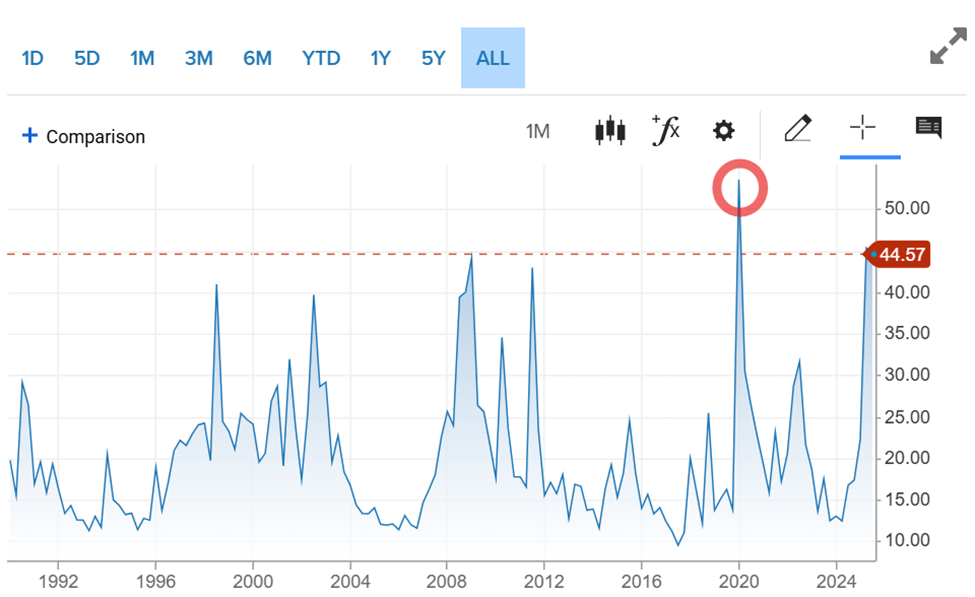US Stock Markets Decline Amid Trade War Fears and Tariff Woes
The S&P 500 Index ($SPX) (SPY) has dropped -2.27%, while the Dow Jones Industrials Index ($DOWI) (DIA) is down -2.65%, and the Nasdaq 100 Index ($IUXX) (QQQ) has fallen -1.98%. In contrast, June E-mini S&P futures (ESM25) have gained +0.56%, and June E-mini Nasdaq futures (NQM25) are up +0.90%.
Stock indexes are sinking, marking a third consecutive session of declines. The S&P 500 has hit a 14-month low, and both the Dow Jones Industrial and Nasdaq 100 have fallen to 15-month lows. Global equity markets are experiencing significant selloffs today due to fears that an escalating trade war might lead the global economy towards recession. Over the weekend, President Trump downplayed the market drop, urging people to “forget the markets for a second” while reaffirming his commitment to the existing tariff policies. Treasury Secretary Bessent also dismissed concerns about slowing economic growth, asserting that an economic boom is forthcoming.
The Barchart Brief: Your FREE insider update on the biggest news stories and investing trends, delivered midday
Despite earlier declines, Stock indexes managed to recover slightly, with the Nasdaq moving back into positive territory thanks to minor rebounds in previously declining chip stocks. Additionally, market participants are holding onto hope that the ongoing tariff issues may prompt the Federal Reserve to lower interest rates. The markets now assign a 46% probability of a 25 basis point rate cut after the May 6-7 FOMC meeting, an increase from 30% last week.
The initial downturn in equity markets began last Wednesday, following President Trump’s announcement of reciprocal tariffs that exceeded expectations, stoking fears that U.S. trade policies could drive both the U.S. and global economies into recession. Selling intensified last Friday when China countered U.S. tariffs by imposing a 34% tariff on all imports from the U.S. effective April 10.
The turmoil in global equity markets has led to a risk-off sentiment among investors, prompting a flight to safety into government bonds while commodity prices are plummeting. For instance, WTI crude oil has dropped to a four-year low, and COMEX copper prices have fallen to a three-month low.
Last Wednesday, President Trump announced a minimum 10% tariff on imports from nearly all countries, with steep reciprocal rates for about 60 nations. New tariffs took effect on Saturday for almost all countries, and higher rates were implemented by April 9. Specific sectors like steel and automobiles received exemptions, while Canada and Mexico remain subjected to previously established 25% tariffs. However, China faces a hefty 34% tariff, raising the total to 67%, while the EU’s total tariffs will reach 39% with a 20% reciprocal charge. Japan will incur a total tariff of 46% due to a 24% reciprocal rate.
Stock prices have faced mounting pressure over the past month, driven by apprehensions that U.S. tariffs may stifle economic growth and corporate earnings. Earlier in March, President Trump implemented 25% tariffs on Canadian and Mexican products and raised tariffs on Chinese goods from 10% to 20%. Last Wednesday, he also signed a proclamation imposing a 25% tariff on U.S. automobile imports, effective Thursday, with an eventual expansion to include automobile parts made outside the U.S. Trump described these tariffs as “permanent,” expressing no interest in negotiating exceptions.
Market participants will keenly watch developments this week, especially regarding U.S. trade policies and potential retaliations from other nations. On Wednesday, the minutes from the March 18-19 FOMC meeting will be released. Additionally, the March Consumer Price Index (CPI) is expected to ease to +2.6% year-over-year, down from 2.8% in February, while March CPI excluding food and energy may also drop to +3.0% from +3.1%. The March Producer Price Index (PPI) final demand is projected to increase to +3.3% year-over-year, compared to +3.2% in February, with March PPI excluding food and energy expected to rise to +3.6% from +3.4%. Lastly, the University of Michigan’s April consumer sentiment index is anticipated to decline to 54.0 from 57.0 in March.
Overseas Stock markets are exhibiting sharp declines today. The Euro Stoxx 50 has dropped to an eight-month low, down -3.89%. China’s Shanghai Composite Index has fallen to a 6.25-month low, closing down -7.34%. Japan’s Nikkei Stock 225 has also plunged to a 17-month low, closing down -7.83%.
Interest Rates
June 10-year T-notes (ZNM25) are down -8 ticks today, with the 10-year T-note yield rising +3.6 basis points to 4.030%. After reaching a 6.25-month high, June T-notes are displaying slight declines. The current tariff tensions are prompting foreign investors to offload dollar assets due to recession fears in the U.S. and growing doubts about the dollar’s stability, placing downward pressure on T-notes. Furthermore, T-notes face negative momentum following comments from Fed Chair Powell indicating that the Fed is not in haste to adjust monetary policy. Supply pressures are also influencing T-notes as the Treasury is set to auction $119 billion in T-notes and T-bonds this week, commencing with a $58 billion offering of 3-year T-notes on Tuesday.
Despite these challenges, T-notes are receiving support from fears that a global trade war could trigger a recession in the U.S. and possibly elsewhere. Today’s global equity market retreat has increased safe-haven demand for government debt securities. Moreover, the sharp decline in crude oil prices has helped reduce inflation expectations, with the 10-year breakeven inflation rate falling to 6.5-month low at 2.139%.
European bond yields are showing mixed performance today. The 10-year German bund yield has dropped to a one-month low of 2.430%, down -3.0 basis points to 2.548%. Conversely, the 10-year UK gilt yield has rebounded from a three-and-three-quarter-month low of 4.363%, rising +5.8 basis points to 4.505%.
In February, Eurozone retail sales increased by +0.3% month-over-month, falling short of the expected +0.5% rise.
The Eurozone April Sentix investor confidence index plummeted -16.6 to a 1.5-year low of -19.5, deviating significantly from the anticipated -9.0 mark.
Germany’s February industrial production decreased -1.3% month-over-month, also below the expected -1.0% drop.
Swaps are now forecasting a 91% chance of a 25 basis point rate reduction by the European Central Bank (ECB) at the upcoming April 17 policy meeting.
US Stock Movers
The Magnificent Seven stocks are currently declining and influencing the overall market trend negatively. Tesla (TSLA) has seen a more than -4% decrease, while Apple (AAPL) is down over -3%. Microsoft (MSFT) has dropped more than -2%. Meta Platforms (META) slipped by -0.79%, Alphabet (GOOGL) decreased -0.43%, and Nvidia (NVDA) is down -0.12%.
Travel and leisure stocks are also under pressure as there are concerns that tariffs might elevate prices for consumers, leading to reduced discretionary spending. Norwegian Cruise Line Holdings (NCLH) and Carnival (CCL) have both dropped more than -7%, while Royal Caribbean Cruises Ltd (RCL) is down over -6%. Other affected stocks include Expedia Group (EXPE), which has fallen more than -6%, and Las Vegas Sands (LVS) and Host Hotels and Resorts (HST).
Downgrades Impact Banking, Airline, and Energy Stocks Today
Banking stocks are under pressure following Morgan Stanley’s downgrade of large-cap and midcap banks from attractive to inline. As a result, prominent banks such as JPMorgan Chase (JPM), Goldman Sachs (GS), Bank of America (BAC), Citigroup (C), US Bancorp (USB), and Synchrony Financial (SYF) have experienced declines of more than -3%.
In the airline sector, stocks are also falling due to downgrades from UBS. Notable airlines like Alaska Air Group (ALK), Delta Air Lines (DAL), and United Airlines Holdings (UAL) saw their shares drop by more than -3% after UBS changed their ratings to neutral from buy.
Meanwhile, stocks linked to cryptocurrency are sliding, reflecting Bitcoin’s (^BTCUSD) price drop of over -8%, marking a five-month low. This downturn has led to significant losses for Coinbase Global (COIN), MicroStrategy (MSTR), MARA Holdings (MARA), and Riot Platforms (RIOT), which are all down more than -7%.
Energy stocks, specifically energy service providers, are experiencing their second consecutive day of losses. The price of WTI crude oil has fallen to a four-year low, causing declines in major companies like Exxon Mobil (XOM), Occidental Petroleum (OXY), Devon Energy (DVN), and Schlumberger (SLB), each down more than -4%.
Additionally, US-listed Chinese stocks are tumbling for the second session after China announced steep tariffs of 34% on all US imports. Companies such as Alibaba Group Holding Ltd (BABA), JD.com (JD), NetEase (NTES), and PDD Holdings (PDD) each declined by over -2%.
Vulcan Materials (VMC) has seen a dip of more than -3% after UBS downgraded the stock to neutral from buy.
Fox Corp (FOXA) is also facing a decrease of more than -3% after Wolfe Research downgraded its stock from peer perform to underperform, setting a price target of $48.
General Motors (GM) saw a drop of more than -3% following Bernstein’s downgrade from market perform to underperform, with a revised price target of $35.
On a brighter note, Dollar Tree (DLTR) is up more than +7%, leading the S&P 500 gainers after Citigroup upgraded the stock to buy from neutral with a new price target of $103.
Furthermore, a rebound among chipmakers is helping to temper losses in the broader market. Applied Materials (AMAT) led the gains in the Nasdaq 100 with an increase of more than +3%. Other companies, including Analog Devices (ADI), Lam Research (LRCX), ON Technology (ON), Marvell Technology (MRVL), GlobalFoundries (GFS), and Microchip Technology (MCHP), have risen by more than +2%.
Earnings Reports (4/7/2025)
Companies reporting include AMMO Inc (POWW), Dave & Buster’s Entertainment (PLAY), and Greenbrier Cos Inc/The (GBX).
On the date of publication, Rich Asplund did not hold any positions in the securities mentioned in this article. All information in this article is for informational purposes only. For further details, please view the Barchart Disclosure Policy here.
More news from Barchart
The views and opinions expressed herein are those of the author and do not necessarily reflect those of Nasdaq, Inc.


